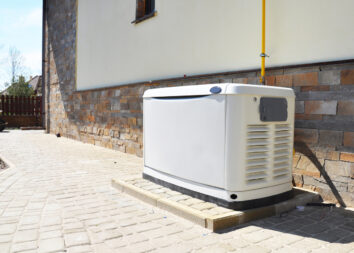There’s never a good time to encounter a plumbing problem — especially in freezing temperatures. Because of the low outdoor temperatures, plumbing problems seem to occur more often in winter than at other times of the year. Read on to learn how you can prevent a plumbing nightmare this season.
Winter Plumbing Concerns
Ongoing coldness puts additional pressure on your home’s pipes. If steps aren’t taken beforehand, with each cold day and night, pipes may move closer to the tipping point and eventually burst. You can avoid an expense repair by preparing your plumbing. Here’s how you can relax in the cozy confines of your humble abode this winter knowing that your plumbing is safe.
Safeguard Your Plumbing Pipes From Becoming Frozen
Water freezes quickly when winter temperatures take a dive. When frozen water inside causes pipes to burst, it becomes seriously dangerous due to the possibility of flooding. In most cases, you won’t notice that a pipe is damaged until you see the rushing water inside your home. Sometimes, cherished furniture ruined by the overflowing water is amongst the unfortunate signals of a burst pipe.In a home flood situation, wood flooring, rugs, all the things that make your home unique can be damaged in a few minutes.
Take precautions to avoid this scenario by insulating pipes using foam tubes with side slits. This is one of the easiest things you can do. The tubes are inexpensive and available in a variety of thicknesses. Most popular are the 1/2-inch diameter thick foam to surround the pipe. You’ll find some that are 3/8-inch thick as well. Tube lengths are usually 6-ft long.
To use, follow these steps:
1. Cut the foam tube to the appropriate length for your pipe.
2. Open the foam tube from the slit opening.
3. Push the foam tube over your pipe.
4. Secure with self-adhesive edges on the foam tube or use duct tape to keep it in place.
Repair Plumbing Leaks
Plumbing leaks, if not attended to right away, only get worse as the days go on. As a result, the expense is greater when the damage is more severe. With that truth in mind, now is the best time to fix any leak in your home’s plumbing system to avoid winter plumbing issues.
Perform an inspection. Pay attention to any dripping faucets and small pools of water. Analyze your laundry room, bathroom, and kitchen faucets. If you spot a leak, call a plumber for a repair right away.
Maintain and Drain Your Water Heater
The minerals inside hard water can lead to sediment accumulation in your hot water heater. This buildup will eventually leak into every water source outlet within your home through the pipes and into faucets. The water you use for cooking, drinking, and bathing can become contaminated.
To avoid this, add replacing your water heater replacement on your list of important things to do for your home this year. However, if your water heater is within its estimated lifespan, have it inspected, drained and flushed by our certified plumbing technicians on a yearly basis.
Remove Your Outdoor Hose
It might seem inconvenient, but something as simple as removing your garden hose can save you time, frustration, and a large repair bill. Left outside, the hose traps water inside of it. Since it’s connected to pipes, water within the hose freezes as well as the faucets attached to the pipes. As you can see, it’s worthwhile to disconnect your garden hose and store it over the winter months.
Cover and Drain Outdoor Shut-Off Values
Water left in an outdoor shut-off value can freeze resulting in damage to your indoor plumbing. To keep this from happening, follow these steps:
1. From indoors, turn the shut-off valve in the off position.
2. Go outside and turn on the outdoor faucet and let it drain until all the water has stopped flowing.
3. Come back inside and place a bucket under the shut-off valve inside your home.
4. Turn the bleeder to open the line to drain the water.
5. When finished, tighten up the bleeder, and then turn the shut-off valve in the on position to supply water to the interior.
Have Your Sump Pump Cleaned
Basement flooding is commonly the result of a malfunctioning sump pump. During warm weather, your sump pump and the pit it sits on should be cleaned. This equipment works hardest in wintertime and since it’s closest to cold ground temperatures, freezing can cause sump pump failure.
Plumbing Services in Woodbury New Jersey
A little maintenance goes a long way, so be sure to use the tips above to avoid winter plumbing issues. Take action now to have more peace of mind for enjoying family times in the warmth of your home. Create memories to share that are void of frozen pipe disaster stories, but full of cheerful experiences worth telling. Our expert plumbers at Harris Plumbing, Heating, Air, & Electric are licensed, certified, and insured. We’re ready to take your call and get your plumbing winter-ready. Contact us today!


